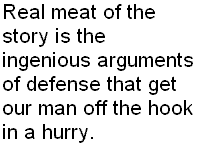"Loophole" (short story): Government bureaucracy doing what it does best - push the papers!

Story summary (spoiler).
Martians have had a technology civilization for a while, while humans are still at a rather primitive stage. With advent of radio on earth, Martian government have been monitoring the development of earthlings.
That is when they detect the three US nuclear explosions - an initial test, & the two bombs dropped on Hiroshima & Nagasaki. A little later, they detect rockets being tested by earthlings.
They decide to act. Several Martian spaceships reach earth, & issue a warning: stick to earth, or face the consequences. No rockets & space exploration allowed for such violent beings.
We are told of above proceedings in the form of memos moving around in Martian bureaucracy - usually with very comic contents.
In the final act, we see the Martian civilization decimated. It seems, the earthlings invented Star Trek style material transporters when rockets were barred! And used that for attack Martians.
End is again a bit of humor, as the victorious earth soldiers on Mars are not too keen on traveling at speed of light via the beam, but would rather prefer rocket travel, & want earth to develop it for their transport!
See also.
- "Travel by Wire!" (1937) (A): This story about a Star Trek type device to beam people & things around has an ending that shares sentiments of returning soldiers in Loophole. One of the inventors of beaming machines who is also behind the big electronic transportation empire prefers traveling the old fashioned way!
Loophole, short story, review
Author: Arthur C Clarke
First published: 1946
Genre: Humor
Rating: A
The story appears in the following collections.
 This lovely little piece of
This lovely little piece of  There were a couple of sentences that I didn't really get, but having fun with this story doesn't really require that you be an American.
There were a couple of sentences that I didn't really get, but having fun with this story doesn't really require that you be an American. Welcome the modern equivalent of the great Druid from the village of Indomitable Gauls. The maker of impossible potions. Because this one is modern, he injects them into your body via a syringe rather than making you drink it. But that is about the only difference.
Welcome the modern equivalent of the great Druid from the village of Indomitable Gauls. The maker of impossible potions. Because this one is modern, he injects them into your body via a syringe rather than making you drink it. But that is about the only difference. It was the tongue-twister title of this story that I first found attractive - in a perverse sort of way. After dusting my 20 year old nearly unused Webster (I had brought it because of beautiful bright red cover!), I found the meaning of "defenestration": throwing someone or something out of window. Ermintrude is the name of a women who happens to be the heroine of the story; Inch is her surname, & her husband's.
It was the tongue-twister title of this story that I first found attractive - in a perverse sort of way. After dusting my 20 year old nearly unused Webster (I had brought it because of beautiful bright red cover!), I found the meaning of "defenestration": throwing someone or something out of window. Ermintrude is the name of a women who happens to be the heroine of the story; Inch is her surname, & her husband's. This comedy is about a computer that rebelled. Or was made to. Or may be the programmer rebelled.
This comedy is about a computer that rebelled. Or was made to. Or may be the programmer rebelled. Every time I begin to get bored with Clarke's stuff, he throws in a surprise. This is an
Every time I begin to get bored with Clarke's stuff, he throws in a surprise. This is an 
